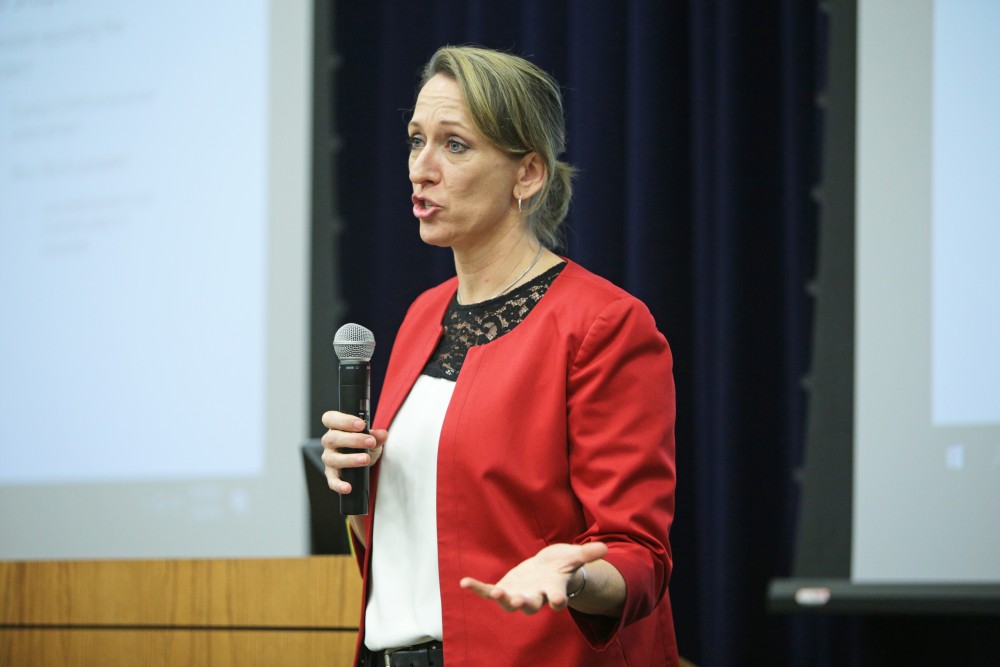GVPD, Title IX discuss sexual assault reporting at campus event

GVL / Emily Frye Detective Sara Fillman on Tuesday February 6, 2018.
Feb 8, 2018
To educate students on what to expect when filing sexual assault reports, It’s on Us As Lakers hosted an informative discussion Tuesday, Feb. 6, in the Mary Idema Pew Library Multipurpose Room. The organization partnered with representatives from the Title IX office, the Grand Valley State University Police Department and the Ottawa County Sheriff’s Office to hold the event.
The panelists explained the complex triangle of their affiliation with each other in their work, their individual processes when a student reports to them and the important details necessary to contribute to the investigations.
“(I want students to know) a little bit of what to expect during an investigation after a sexual assault is reported (and) what’s going to happen next,” said Ottawa County Detective Sara Fillman. “I think that’s the biggest fear (and) sometimes where our challenges come in law enforcement, (when) someone (has) waited, or they’re just not sure what’s going to happen, so they wait or don’t report at all. The main thing is to feel more comfortable and realize it’s a process that is valuable and supportive of a victim survivor.”
A student should know that when they or a friend have been sexually assaulted, there are options available to them. Theresa Rowland, GVSU Title IX coordinator and equity officer/director, emphasized prioritizing health in terms of emotional support and medical attention, preserving evidence and considering reporting incidents.
Whether students report to the Title IX office, GVPD or the Ottawa County Sheriff’s Office, evidence is an important factor in all departments. Although surviving victims may want to destroy or forget their situation, Rowland and Fillman stressed the importance of protecting evidence, much of which is in the form of photos, text messages, social media posts and other electronic evidence. These are the components Title IX investigators sift through when an assault is brought to their attention.
When a student seeks medical attention, which is available to them at the Young Women’s Christian Association (YWCA), the nurse examiner may collect and save evidence, such as bodily fluid or saliva, for 180 days. This gives enough time for the survivor to decide if they want to report and hand the evidence off to the police. GVPD Acting Director Brandon DeHaan mentioned that saving anything from clothing to Snapchat pictures is vital to criminal investigators as they dive deeper into the incident.
“Often, what we find during the course of any of our investigations is the first thing that happens with the victim survivor is they say, ‘I am very upset about what took place, and I want to destroy everything I saw that happened to me and everything that goes with it,’” DeHaan said. “While I understand that gut reaction and (the) reason why that is the case, often there is some very valuable evidence that can be important not only for the criminal investigation but also for the Title IX investigation.”
The panelists also discussed how they assist students who have been sexually assaulted. When surviving victims choose to proceed with reporting, they can choose to include Title IX, Ottawa County or both in the investigation. Title IX’s job is to remain neutral and search for facts during the discussions. The office adheres to the rights of the reporting and responding parties and looks for violation of university policy.
Ottawa County also seeks to remain unbiased and fair to both parties as its officers look to enforce the law. In reporting to police, survivors may help others testify in similar cases because perpetrators often use the same method when sexually assaulting. Even if there is doubt about a student’s case being solved, a pattern could be found within students’ cases, and they may be able to testify for one another in court about the same offense.
“I would encourage if you have a friend or someone who feels like there’s not enough evidence, (so) it won’t get prosecuted, to report it to us anyway,” Fillman said. “And maybe down the line, maybe we can’t prove your case, but I may have enough information from you and someone else’s case (to) make their case.”
For attendees, the event was informative.
“I thought it was really inspirational,” said GVSU student Katelyn White. “I didn’t know anything about Title IX at all before this. I think it’s kind of cool (that) now I know what to do if someone asks or if I ever need it myself, and I thought it was helpful.”
For more information about victims’ options, visit www.gvsu.edu/vro/.























